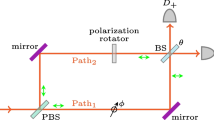Abstract
It is demonstrated that ‘quantum eraser’ (QE) experiments do not erase any information. Nor do they demonstrate ‘temporal nonlocality’ in their ‘delayed choice’ form, beyond standard EPR correlations. It is shown that the erroneous erasure claims arise from assuming that the improper mixed state of the signal photon physically prefers either the ‘which way’ or ‘both ways’ basis, when no such preference is warranted. The latter point is illustrated through comparison of the QE spatial state space with the spin-1/2 space of particles in the EPR-spin experiment.
Similar content being viewed by others
Notes
That is, it cannot be considered an epistemic mixed state, in which the system is ‘really’ in one of the pure states and the sum represents ignorance of that state.
In Walborn et al. [2], the signal photon’s polarization may be detected at the screen, which constitutes a measurement of either the X or Z observable (depending on which polarization measurement takes place). Then it will project its partner into a state corresponding to that outcome, and the appropriate statistics will be found upon taking subsets of the coincidence count. If the Z observable is always measured via polarization at the screen, then the Z basis is preferred at t1, and mutatis mutandis for the X observable. But such a preference does not arise based on a representation of the entangled state (8) in any particular basis. It can only arise through a physical measurement process, e.g. detection of the photon’s circular polarization through transfer of angular momentum. After that outcome is registered, the attendant information is never ‘erased’ by a noncommuting measurement of its partner, as shown in subsequent sections.
This is a well-established (but often forgotten) fact about component subsystems of non-separable states. See, for example, Hughes [4].
While this mutual ‘steering’ is counterintuitive, as analyzed and discussed by Schrodinger [5], again, it is no different from what goes on in the standard EPR situation, which does not involve ‘erasure’ or explicit retrocausation—just the usual fact that entangled quantum systems exert apparently nonlocal influences on one another.
If the detections are timelike separated, then the quantum detected first unambiguously projects the second quantum into a pure state, which dictates the probabilities of its outcomes for all measurements, and again, there is no ‘delayed’ or explicitly retrocausal effect.
This applies to the version of the experiment without polarization entanglement. If polarization entanglement yields a which-way or both-ways basis preference at the signal detection screen, we still have ordinary EPR ‘steering,’ as discussed below.
Ellerman [6] makes a similar point in his critique of the usual conclusions regarding the ‘delayed choice quantum eraser.’
References
Kim, Y.-H., Yu, R., Kulik, S.P., Shih, Y., Scully, M.O.: Delayed “choice” quantum eraser. Phys. Rev. Lett. 84, 1 (2000)
Walborn, S.P., Terra Cunha, M.O., Pádua, S., Monken, C.H.: Double-slit quantum eraser. Phys. Rev. A 65, 033818 (2002)
Ma, X.S., et al.: Quantum erasure with causally disconnected choice. PNAS 110(4), 1221–1226 (2013). https://doi.org/10.1073/pnas.1213201110
Hughes, R.I.G.: The Structure and Interpretation of Quantum Mechanics. Harvard University Press, Harvard (1992)
Schrodinger, E.: Probability relations between separated systems. Math. Proc. Cam. Philos. Soc. 32(3), 446–452 (1936)
Ellerman, D.: Why delayed choice experiments do not imply retrocausality. Quantum Stud. Math. Found. 2(2), 183–199 (2015)
Acknowledgements
The author would like to thank David Ellerman and an anonymous referee for valuable comments.
Author information
Authors and Affiliations
Corresponding author
Additional information
Publisher’s Note
Springer Nature remains neutral with regard to jurisdictional claims in published maps and institutional affiliations
Rights and permissions
About this article
Cite this article
Kastner, R.E. The ‘Delayed Choice Quantum Eraser’ Neither Erases Nor Delays. Found Phys 49, 717–727 (2019). https://doi.org/10.1007/s10701-019-00278-8
Received:
Accepted:
Published:
Issue Date:
DOI: https://doi.org/10.1007/s10701-019-00278-8




